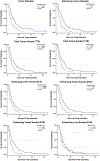Identifying enhancement-based staging markers on baseline MRI in patients with colorectal cancer liver metastases undergoing intra-arterial tumor therapy
- PMID: 34061209
- PMCID: PMC8848338
- DOI: 10.1007/s00330-021-08058-7
Identifying enhancement-based staging markers on baseline MRI in patients with colorectal cancer liver metastases undergoing intra-arterial tumor therapy
Abstract
Objectives: To determine if three-dimensional whole liver and baseline tumor enhancement features on MRI can serve as staging biomarkers and help predict survival of patients with colorectal cancer liver metastases (CRCLM) more accurately than one-dimensional and non-enhancement-based features.
Methods: This retrospective study included 88 patients with CRCLM, treated with transarterial chemoembolization or Y90 transarterial radioembolization between 2001 and 2014. Semi-automated segmentations of up to three dominant lesions were performed on pre-treatment MRI to calculate total tumor volume (TTV) and total liver volumes (TLV). Quantitative 3D analysis was performed to calculate enhancing tumor volume (ETV), enhancing tumor burden (ETB, calculated as ETV/TLV), enhancing liver volume (ELV), and enhancing liver burden (ELB, calculated as ELV/TLV). Overall and enhancing tumor diameters were also measured. A modified Kaplan-Meier method was used to determine appropriate cutoff values for each metric. The predictive value of each parameter was assessed by Kaplan-Meier survival curves and univariable and multivariable cox proportional hazard models.
Results: All methods except whole liver (ELB, ELV) and one-dimensional/non-enhancement-based methods were independent predictors of survival. Multivariable analysis showed a HR of 2.1 (95% CI 1.3-3.4, p = 0.004) for enhancing tumor diameter, HR 1.7 (95% CI 1.1-2.8, p = 0.04) for TTV, HR 2.3 (95% CI 1.4-3.9, p < 0.001) for ETV, and HR 2.4 (95% CI 1.4-4.0, p = 0.001) for ETB.
Conclusions: Tumor enhancement of CRCLM on baseline MRI is strongly associated with patient survival after intra-arterial therapy, suggesting that enhancing tumor volume and enhancing tumor burden are better prognostic indicators than non-enhancement-based and one-dimensional-based markers.
Key points: • Tumor enhancement of colorectal cancer liver metastases on MRI prior to treatment with intra-arterial therapies is strongly associated with patient survival. • Three-dimensional, enhancement-based imaging biomarkers such as enhancing tumor volume and enhancing tumor burden may serve as the basis of a novel prognostic staging system for patients with liver-dominant colorectal cancer metastases.
Keywords: Colorectal neoplasms; Magnetic resonance imaging; Neoplasm staging; Radiology, interventional; Treatment outcome.
© 2021. European Society of Radiology.
Conflict of interest statement
Figures



Similar articles
-
3D Quantitative tumour burden analysis in patients with hepatocellular carcinoma before TACE: comparing single-lesion vs. multi-lesion imaging biomarkers as predictors of patient survival.Eur Radiol. 2016 Sep;26(9):3243-52. doi: 10.1007/s00330-015-4168-3. Epub 2016 Jan 13. Eur Radiol. 2016. PMID: 26762942 Free PMC article.
-
Identifying Staging Markers for Hepatocellular Carcinoma before Transarterial Chemoembolization: Comparison of Three-dimensional Quantitative versus Non-three-dimensional Imaging Markers.Radiology. 2015 May;275(2):438-47. doi: 10.1148/radiol.14141180. Epub 2014 Dec 19. Radiology. 2015. PMID: 25531387 Free PMC article.
-
Imaging Biomarkers of Tumor Response in Neuroendocrine Liver Metastases Treated with Transarterial Chemoembolization: Can Enhancing Tumor Burden of the Whole Liver Help Predict Patient Survival?Radiology. 2017 Jun;283(3):883-894. doi: 10.1148/radiol.2016160838. Epub 2016 Nov 10. Radiology. 2017. PMID: 27831830 Free PMC article.
-
Intra-arterial therapies for liver cancer: assessing tumor response.Expert Rev Anticancer Ther. 2017 Feb;17(2):119-127. doi: 10.1080/14737140.2017.1273775. Epub 2016 Dec 27. Expert Rev Anticancer Ther. 2017. PMID: 27983883 Review.
-
Intra-arterial therapies for unresectable and chemorefractory colorectal cancer liver metastases: a systematic review and meta-analysis.HPB (Oxford). 2018 Oct;20(10):905-915. doi: 10.1016/j.hpb.2018.04.001. Epub 2018 Jun 7. HPB (Oxford). 2018. PMID: 29887263
Cited by
-
Lipiodol Deposition and Washout in Primary and Metastatic Liver Tumors After Chemoembolization.In Vivo. 2021 Nov-Dec;35(6):3261-3270. doi: 10.21873/invivo.12621. In Vivo. 2021. PMID: 34697157 Free PMC article.
-
Analysis of Tumor Burden as a Biomarker for Patient Survival with Neuroendocrine Tumor Liver Metastases Undergoing Intra-Arterial Therapies: A Single-Center Retrospective Analysis.Cardiovasc Intervent Radiol. 2022 Oct;45(10):1494-1502. doi: 10.1007/s00270-022-03209-9. Epub 2022 Aug 8. Cardiovasc Intervent Radiol. 2022. PMID: 35941241 Free PMC article.
-
Advances in magnetic resonance imaging for the evaluation of colorectal liver metastases in context of individualized precision medicine.ILIVER. 2025 May 12;4(2):100168. doi: 10.1016/j.iliver.2025.100168. eCollection 2025 Jun. ILIVER. 2025. PMID: 40636465 Free PMC article. Review.
-
Outcomes of repeat conventional transarterial chemoembolization in patients with liver metastases.Ann Hepatol. 2024 Nov-Dec;29(6):101529. doi: 10.1016/j.aohep.2024.101529. Epub 2024 Jul 19. Ann Hepatol. 2024. PMID: 39033928 Free PMC article.
-
Diagnostic performance of contrast-enhanced CT combined with contrast-enhanced MRI for colorectal liver metastases: a case-control study.BMC Gastroenterol. 2025 Mar 20;25(1):188. doi: 10.1186/s12876-025-03785-3. BMC Gastroenterol. 2025. PMID: 40114056 Free PMC article.
References
-
- DeSantis CE, Lin CC, Mariotto AB et al. (2014) Cancer treatment and survivorship statistics, 2014. CA Cancer J Clin 64: 252–271 - PubMed
-
- Engstrom PF, Arnoletti JP, Benson AB et al. (2009) NCCN Clinical Practice Guidelines in Oncology: colon cancer. J Natl Compr Canc Netw 7:778–831 - PubMed
-
- Saltz LB, Douillard JY, Pirotta N et al. (2001) Irinotecan plus fluorouracil/leucovorin for metastatic colorectal cancer: a new survival standard. Oncologist 6:81–91 - PubMed
MeSH terms
Substances
Grants and funding
LinkOut - more resources
Full Text Sources
Medical

